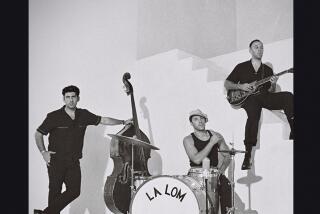Los Lobos, Los Lonely Boys dip into rock history at Greek Theatre
More than half a century has elapsed since Pacoima’s own Ritchie Valens and Lubbock, Texas, native son Buddy Holly died in a small-plane crash with the Big Bopper and their pilot while touring the Midwest. But their legacy as two of rock ‘n’ roll’s founding blood brothers rumbled on in Sunday night’s Greek Theatre double bill of Chicano elder statesmen Los Lobos and Tex-Mex blues belters Los Lonely Boys.
Suave and stately as a ’64 Impala lowrider, Los Lobos closed its rich, retrospective set with “La Bamba,” the traditional son jarocho folk tune that Valens transformed into a Top 40 classic by injecting a rock beat. Los Lobos demonstrated the syncretism of English- and Spanish-language rock by stirring Valens’ tune into a mini-medley with the Young Rascals’ “Good Lovin.’ ”
No surprise there, of course. The East L.A. band has built a nearly four-decade career on excavating, animating and repurposing rock’s Latin roots. Rock’s historic Spanish accent still hasn’t been fully acknowledged by the music’s Anglo-centric official guardians, but we’re getting there slowly but surely.
Half as expected, and therefore doubly welcome, was Los Lonely Boys’ gritty, heartfelt version of Holly’s “Well . . . All Right,” a song that’s been covered by everyone from British supergroup Blind Faith to Santana, two of Los Lonely Boys’ obvious forebears. Literal blood brothers, the Garza siblings -- Henry (who plays guitar like Santana and sings like Eric Clapton), Jojo (bass and vocals) and Ringo (drums) -- are first-rate musicians and assiduous students of rock, R&B;, country and Tejano history.
In October they’re scheduled to release an EP, titled “1969,” of covers from that landmark year, a testament to their wide-ranging knowledge of, and respect for, their musical mentors.
The Garzas also have absorbed the explosiveness of hip-hop beats, lending a contemporary urban vitality to their heroic vision of blues-rock. And they possess the kind of instinctive flair for harmonizing that only musicians sprung from the same DNA are fully able to pull off. All these strengths coalesce on songs like the funky Spanglish “Senorita” and set-opener “Heart Won’t Tell a Lie,” a straight-ahead tune that’s emboldened by one of Henry Garza’s theatrical power solos.
The trio’s Achilles’ heel remains its robust but interpretively limited vocal stylings and its lyrics, which tend toward well-worn sentiments about sticking out troubled love affairs and begging hot mamacitas for un besito. These are fine opening lines for bar-band boogieing. But now that Los Lonely Boys are segueing into their 30s, it’d be nice to see them push their songwriting to the same sophisticated level as their musicianship. They have the talent and commitment to do it.
Complex ideas and mature emotions are terra firma for Los Lobos’ songwriting tandem, Louie Perez and David Hidalgo, whose large catalog is a virtual encyclopedia of rock’s evolution in the land of 1,000 dances. As self-effacing as Los Lonely Boys are self-dramatizing, this graying but still dynamic ensemble drew the mostly middle-age crowd into the aisles by exhibiting the rousing community-minded high-spiritedness of a Garfield High School sock hop.
Leading off with “Evangeline,” the band traced an arc from its rockabilly salad days to the poetic, accordion-haunted surrealism of “Kiko and the Lavender Moon” and the jangly affirmation of “The Neighborhood.” Apart from some apparent sound-mixing difficulties that rendered Steve Berlin’s saxophone practically mute for the first couple of songs, their set embodied un-showy professionalism, striking their characteristic balance between concision and comprehensiveness, rowdiness and thoughtful repose.
Hitting an emotional climax with the sentimental favorites “Mexico Americano” and “Volver Volver,” Los Lobos on Sunday served a reminder that the best way to honor rock’s original giants is by forcing their music to keep growing up.
--
More to Read
The biggest entertainment stories
Get our big stories about Hollywood, film, television, music, arts, culture and more right in your inbox as soon as they publish.
You may occasionally receive promotional content from the Los Angeles Times.











